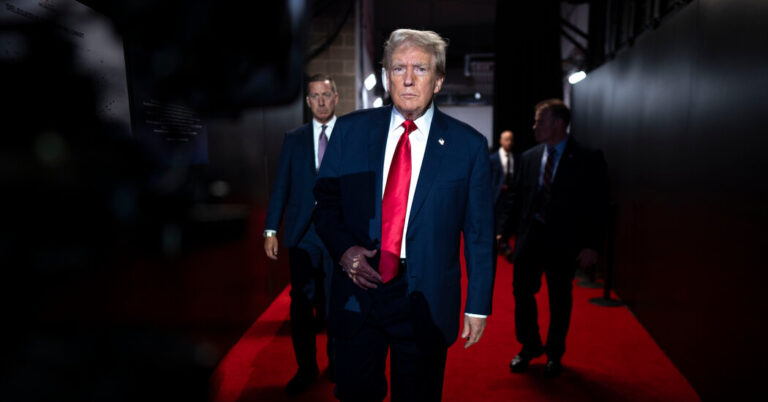Republican presidential candidate Donald J. Trump said Taiwan should pay the United States for defending it from China, highlighting the uncertainty and high stakes of how he would handle the simmering Taiwan Strait dispute if he is re-elected.
Taiwan relies on U.S. political and military support to resist pressure from Beijing, which claims the island as Chinese territory. Trump has signaled his intention to take a more blunt, conditional approach toward Taiwan, warning that it is vulnerable to any attack from China and far from U.S. protection.
“I think Taiwan should pay for its defense,” Trump said in an interview with Bloomberg Businessweek published on Tuesday. “We’re no different than an insurance company.”
Just as Trump’s disdain for NATO has unsettled U.S. allies, his comments about Taiwan have raised questions about how committed he will be to defending the island in a second term. The United States is obligated by law to help Taiwan defend itself, leaving open the possibility of sending in troops if Beijing attacks Taiwan.
Trump also criticized Taiwan’s dominance in advanced semiconductor manufacturing, saying “they’ve taken about 100 percent of our semiconductor business.”
Shares in Taiwan Semiconductor Manufacturing Co. (TSMC), the world’s largest maker of advanced computer chips, fell 2.4 percent on the Taiwan Stock Exchange on Wednesday, in an apparent reaction to his comments.
Trump has made similar remarks about Taiwan in recent years, but his latest comments could have greater implications for Taiwan given his leading position in the election campaign against President Biden.
“If I were in Taiwan, I would take this comment seriously because this is not an isolated remark, this is part of a pattern,” said David Sachs, an Asia fellow at the Council on Foreign Relations. “This comment in particular reflects his purely transactional view of foreign policy and is typical of Trumpism.”
While Taiwan already pays almost all of its arms orders from U.S. manufacturers, the Biden administration is moving to tap U.S. stockpiles and transfer some military equipment directly to Taiwan. Trump’s broader point seems to be that Taiwan owes more to the United States for its overall security.
Still, Taiwan experts said Trump’s comments should not be interpreted as a final decision on U.S. policy toward China and Taiwan if he wins the November election, and that voices in Washington, including Republican vice presidential nominee J.D. Vance, could influence Trump’s position, they said.
“During his presidency, he never publicly spoke about abandoning Taiwan,” said Alexander C. Huang, an international security expert who advises Taiwan’s opposition Kuomintang, referring to Trump’s term, which ended in January 2021. “We also already know that if President Trump returns to the White House, he will ask Taiwan to assume more responsibility for our defense.”
Taiwan’s government has been increasing military spending and will begin extending conscription from four to 12 months in 2022. But many Taiwanese experts and officials say Taiwan will need to spend more to deter China’s much larger military.
While both the Trump and Biden administrations have expanded support for Taiwan, U.S. relations with Beijing’s President Xi Jinping have deteriorated significantly over the past eight years. China’s Foreign Ministry on Wednesday again condemned U.S. arms sales to Taiwan and announced it would suspend highly uncertain nuclear arms control talks with the United States in retaliation.
Vance, Trump’s running mate, and other Republicans have argued that China remains America’s most pressing global challenge, and some say defending Taiwan should be a higher priority for Washington than supporting Ukraine against Russia.
“First of all, I think we should make it as difficult as possible for China to occupy Taiwan,” Vance told The New York Times in an interview published last month. “The reason we don’t do that is because we’re sending weapons to Ukraine, not Taiwan.”
Taiwanese officials have been eager to seek bipartisan support in Congress, and Taiwan supporters within the Republican Party could be persuaded to tone down their skepticism of Taiwan if Trump wins, said Raymond Cheng-en Song, vice president of the Taiwan government-affiliated Prospect Foundation.
“The strategic competition between the United States and China is a key issue for everyone in President Trump’s national security community,” he said. If Trump is re-elected, “they will have a task to educate him about the importance of Taiwan,” he added.
Still, Trump’s comments are likely to spur efforts by Taiwan to assure the United States – and Trump – that it is committed to completing a semiconductor factory in Arizona and increasing its military spending.
Taiwan’s Premier Zhao Yongtai responded to Trump’s comments by saying, “We are ready to take on more responsibility. This is our self-defense,” adding that he was “very grateful for the support of the United States.”
Officials in Washington have long been concerned about the world’s reliance on Taiwan for advanced semiconductors, the tiny computer chips that power electronic devices from iPhones to fighter jets.
Over the past four years, TSMC has committed to building new factories in Japan, Germany and Arizona. In April, the Biden administration awarded Taiwan Semiconductor Manufacturing Co. (TSMC) a $6.6 billion grant to bring cutting-edge semiconductor manufacturing to the United States.
Trump suggested it was a bad deal.
“Right now we’re giving Taiwan billions of dollars to manufacture new semiconductors in their country, and now they’re trying to take that money too,” Trump said in the interview. He said Chinese leader Xi Jinping also wants Taiwan’s semiconductor facilities. “Taiwan is President Xi Jinping’s centerpiece,” Trump said.
Eric Huang, vice president of DigiTimes, a Taiwan-based tech industry market research firm, said the idea that Taiwan has “stealthed” semiconductor business from the U.S. is a misconception. Most of the world’s top semiconductor companies by market capitalization are U.S. companies, such as Nvidia and Qualcomm, Mr. Huang said.
“Taiwan plays a supporting role, primarily by providing manufacturing services to U.S. semiconductor companies,” he said.
Megan Tobin and John Liu Contributed report.

